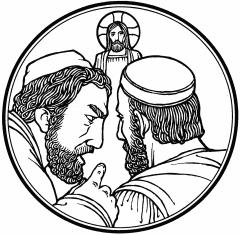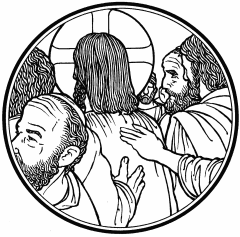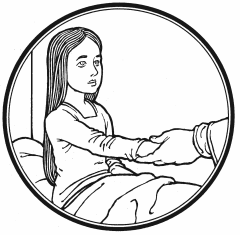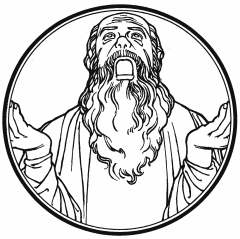 Grace, mercy, and peace to you from God our Father, and from our Lord and Savior, Jesus Christ, amen. The text for the sermon is the Gospel, which was read earlier.
Grace, mercy, and peace to you from God our Father, and from our Lord and Savior, Jesus Christ, amen. The text for the sermon is the Gospel, which was read earlier.
When my boys wake up every morning, they often play downstairs, maybe play a little upstairs and then this is what I hear, “Dad, I want some supper.” Aside from saying the wrong meal of the deal, I know what they want: food. So after you feed them breakfast and not supper, a little while goes by before I hear this next line: “I want a snack.” How could they really want a snack after just eating not that long before?
Things are not all that different for us, are they? We eat a meal and the next thing you know we are looking in the fridge or pantry for something else to eat all because we’re hungry. Our problem is we are focused on earthly food, but what we fail to focus on is the heavenly food which we receive.
In looking at our text, Jesus begins with the words He ended last week’s text with: “I am the bread of the life; whoever comes to me shall not hunger, and whoever believes in me shall never thirst.”
In his ongoing conversation with the Jews, Jesus repeats the theme of his teaching—“I am the bread of life.” Already, we have heard that this bread of life is superior to the manna bread that God gave the Israelites, for it is bread for the soul and not the body. Furthermore, Jesus has declared the good news that the bread of life is given to man as a divine gift and not a result of his own efforts.
Today, Jesus further expounds on his bread of life theme for us, telling His hearers that he who eats this bread will live forever. And while the people had expressed desire for such bread, you don’t exactly see them falling over themselves to worship Jesus when He reveals that He is that bread. Instead, we get a lot of confused looks and grumbling. This is because the sinful heart of man does not receive the Gospel of Christ joyfully with open arms. It questions the Lord and is disappointed because Christ Jesus is not someone we can mold into whoever we want Him to be.
When it comes to the bread of life that grants life eternal, Jesus’ words themselves give life. Jesus tells us what is in the bread of life, namely Himself, and tells us what it does for us. But it is interesting to observe how Jesus’ words are treated in our day, when health, fitness, and nutrition are given so much prominence. We check labels on almost everything we buy—often under doctor’s orders—the calories, sodium, trans fats and the carbs! We become obsessed with monitoring everything that we and our children take into our bodies, but such vigilance is lacking when it comes to what we take into our souls.
Jesus is the bread of life because He is the one thing we need. All of the other things we think we need, we can live without, at least for a time. Food—you can fast for a time. You won’t die. The company of other people—you can have a time of solitude. Sometimes it’s even helpful to be alone. Money—it’s an illusion to think you will be happy if you have enough of it. Sex—people can go their whole lives as virgins and be content and happy. But a relationship with God is the one thing we can’t really live without. We can’t find peace, we can’t have a lasting purpose, and we can’t know who we truly are. And the only way to approach God is through Jesus Christ.
Through Jesus’ gracious invitation, He bids us to come to Him and be fed with food that will never pass away, with food that will never cause us to be hungry again. Listen to the words of Jesus: “For this is the will of my Father, that everyone who looks on the Son and believes in him should have eternal life, and I will raise him up on the last day.” This eternal life comes from the bread of life, from Jesus Christ, and from nothing else.
Jesus’ message is clear: if you eat of the bread of life, you will have life and you won’t hunger spiritually because you will have what you’ve been looking for. If you refuse to eat, you won’t enjoy the benefits of eternal life and you’ll be among the walking dead. The Word of God, made flesh, who dwells among us, is giving Himself to feed us. We need that food; we couldn’t purchase that kind of bread. Earthly food is all we can buy; God gives freely eternal life and I pray we never lose the hunger for that.
Unfortunately, there are those that see no need for that eternal life and the bread of life that our Lord gives. They think that there are other ways to achieve eternal life or another source as the bread of life. However, there is only way to receive eternal life and there is only one bread of life, Jesus Christ. We don’t work our way to heaven and get there by being good or leading mostly good lives. We know we don’t ever belong there on our merits, but God invites us to believe in Jesus, the author and perfector of our faith. We shouldn’t follow Christ, acting like our lives might go better if we follow Him. If anything, we can expect challenges to our faith to increase. We do not follow our next meal of loaves of bread to fill the stomach for one day, but to believe in Jesus as the very bread of life Himself.
In all these things, God gives you the bread of life that came down from heaven, your Lord Jesus Christ. He alone is the bread that nourishes your soul. He alone is the sustenance that also gives life. For this reason, Jesus tells you today that when you eat of the bread of life you will live forever. He gives you His own flesh, which is for the life of the entire world.
What better place is there for you to receive the bread of life than here at the Lord’s altar, where you receive His body and His blood? The true bread from heaven is here for you, for Jesus Himself is present. Jesus bids you to come, all who are weary and heavy laden, and He will give you rest. He will strengthen you in faith and draw you closer to Himself. He promises to forgive you your sins and to remember them no more. And He sanctifies you with His gifts, that you might live a Christian and God-pleasing life. In so doing, He empowers you to live in the way that Paul described in today’s epistle: putting away all bitterness, and wrath, and anger; being kind to one another, tenderhearted, forgiving one another as God in Christ has forgiven you!
The invitation has been extended to you by your heavenly Father to come and to feast on the bread of life, for “if anyone eats of this bread, he will live forever.” In Jesus’ name, amen. Now the peace of God that passes all understanding, keep your hearts and minds through faith in Christ Jesus, amen.



